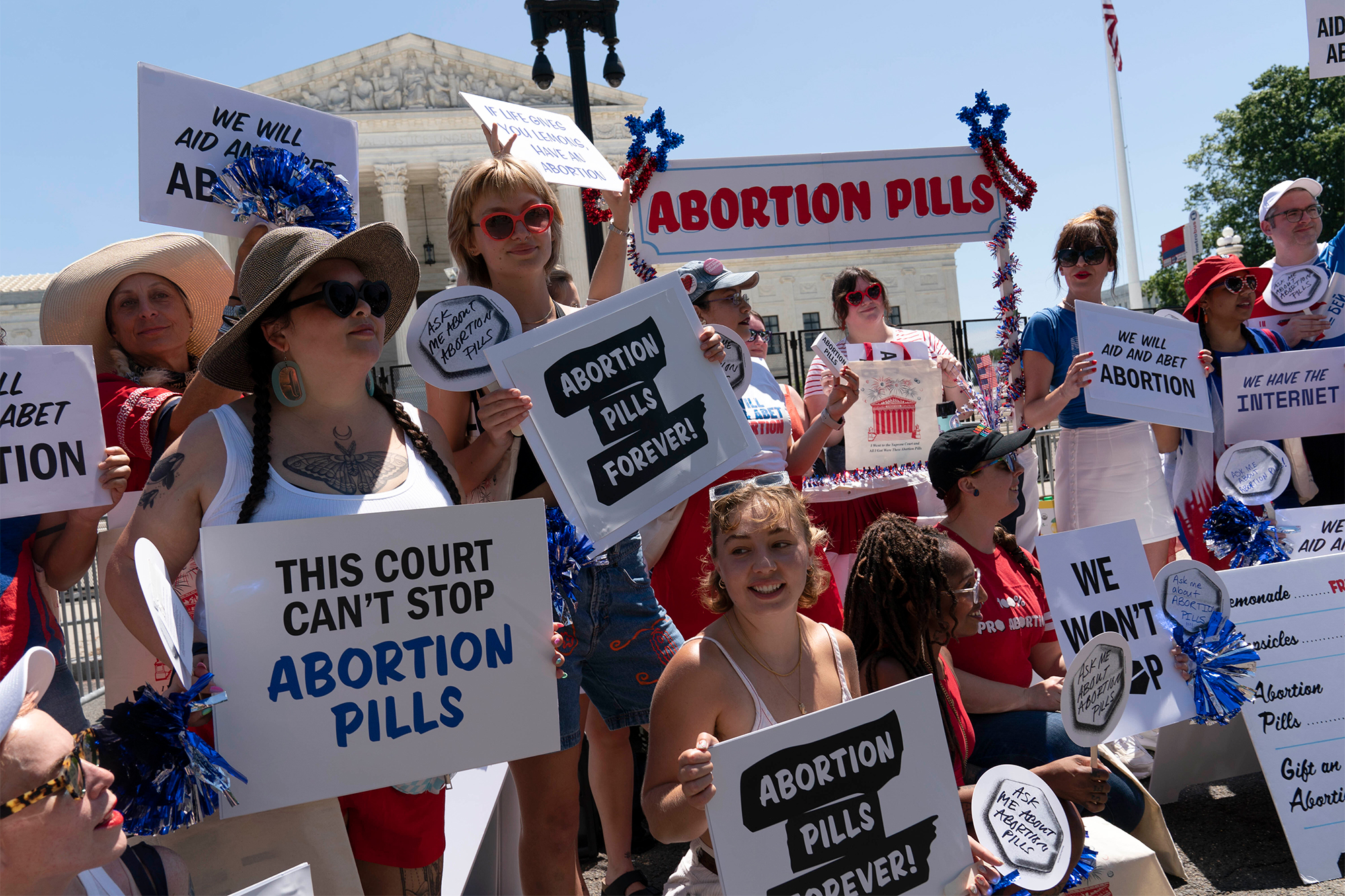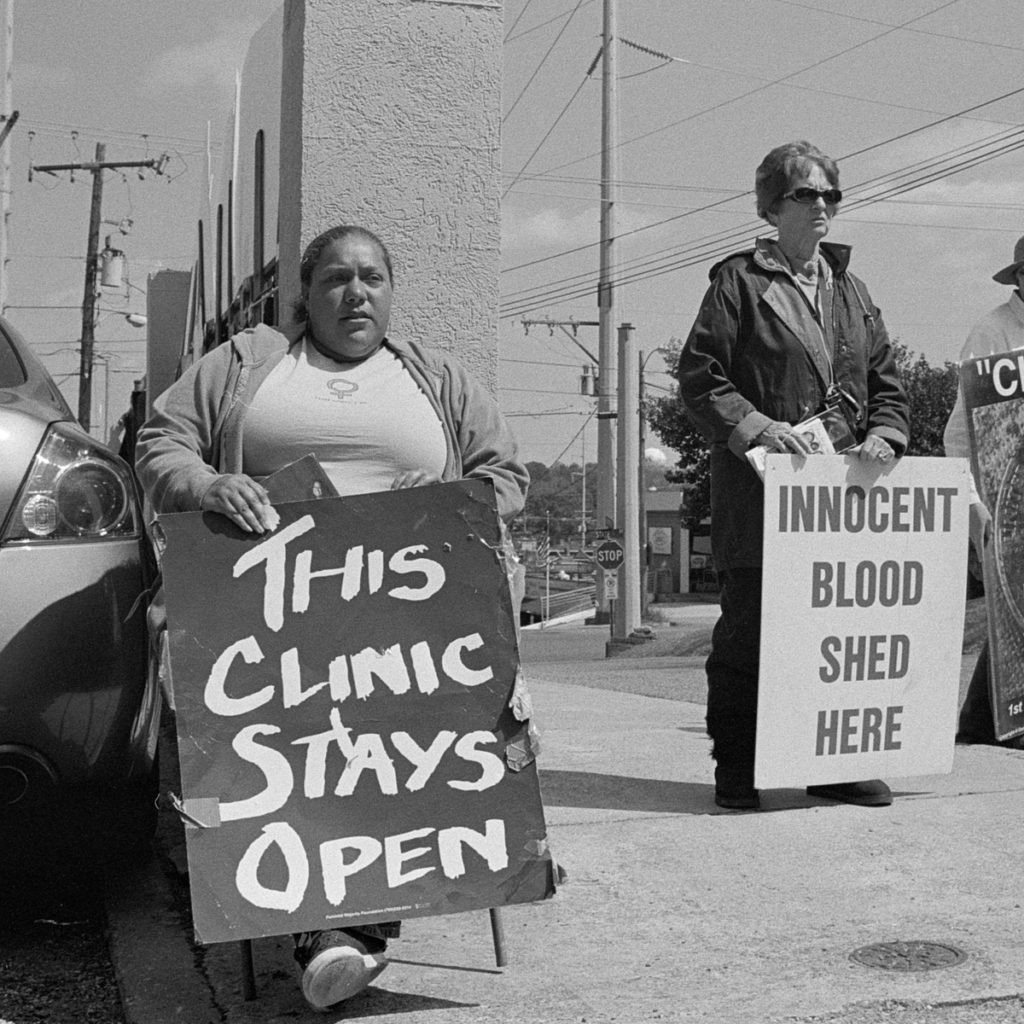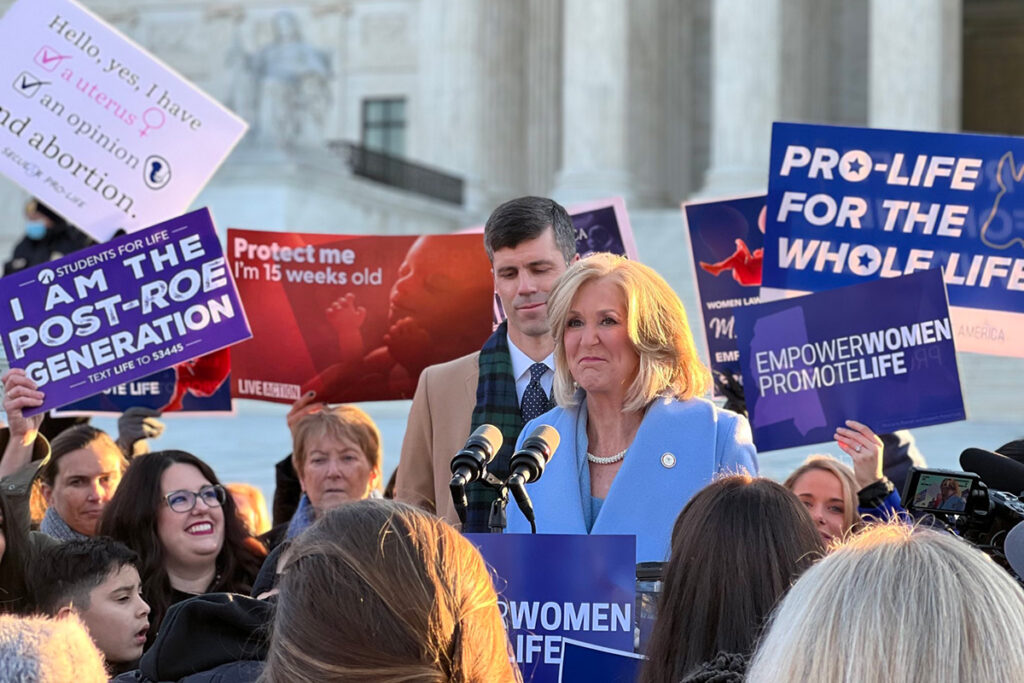A federal appeals court should block access to the abortion pill mifepristone nationwide, including in states where it remains legal, Mississippi’s attorney general and four state Republican members of Congress told a three-judge panel in briefs filed Wednesday.
Mississippi Attorney General Lynn Fitch, who successfully argued for the overturn of Roe v. Wade in last year’s Dobbs v. Jackson Women’s Health Organization ruling, argued against mifepristone in a friend-of-the-court brief joined by 19 states yesterday morning. Abortion has been broadly illegal in Mississippi since last year, but the ruling Fitch wants could severely restrict access nationwide since abortion pills are now used in the majority of abortions where it remains legal.
A lower-court federal judge in Texas, Trump-appointee Matthew Kacsmaryk, issued a ruling on April 7 reversing the U.S. Food and Drug Administration’s two-decade-old decision to approve mifepristone, which is one of only two FDA-approved drugs for abortions. He argued that the “FDA acquiesced on its legitimate safety concerns—in violation of its statutory duty—based on plainly unsound reasoning and studies that did not support its conclusions.”
The Biden administration appealed the decision, which was set to take effect on Friday, to the 5th U.S. Circuit Court of Appeals in New Orleans while arguing that the ruling imperiled the FDA’s ability to continue regulating and approving drugs without interference from federal courts. On Wednesday night, a three-judge panel at the appeals court allowed mifepristone to remain available while the case proceeds, but with tighter restrictions.
“One thing is evident: Over the past two decades, the FDA has engaged in political calculations, not scientific ones, when it comes to chemical abortion,” Fitch claimed in a statement Wednesday morning. “It is our hope that the Fifth Circuit sees how the FDA’s brazen attempt to trample on federal and state laws endangers both the health of women and democracy and takes decisive action to uphold the people’s right to regulate abortion.”
Despite those claims, the FDA used the same approval process for mifepristone as it has for other drugs, and studies have found that mifepristone is safer than more common drugs like penicillin, Tylenol and Viagra. The drug, also known as RU486, had been available in Europe for over a decade before the FDA approved it in 2000, making it the first abortion medication available in the U.S.
‘Safe And Effective Treatment’
On Tuesday, the former FDA commissioner who was in charge at the time of mifepristone’s approval, Jane Henney, defended the process on NPR.
“Well, I can assure you that mifepristone was handled in a very proper way,” she said. “It was given a very thorough review. It was not rushed. The approval process, in terms of looking at all of the scientific data, all of the clinical data, the data around how this drug was manufactured followed the normal process of how the FDA reviews every product that it has.”

The Biden administration asked for a stay on Kacsmaryk’s ruling, arguing that it “upended decades of reliance by blocking FDA’s approval of mifepristone and depriving patients of access to this safe and effective treatment, based on the court’s own misguided assessment of the drug’s safety.”
The three-judge panel only partially granted that request, though, allowing mifepristone’s original 2000 approval to remain in effect for now because the statute of limitations had already passed on challenging it. But the court allowed Kacsmaryk’s decision to block all subsequent actions the FDA has taken to loosen restrictions on mifepristone to stand. On Thursday, though, U.S. Attorney General Merrick Garland said the Department of Justice will ask the U.S. Supreme Court to put a hold on all limits to access while the case proceeds.
If the 5th Circuit’s decision remains, though, that means mifepristone will be approved for up to seven weeks of pregnancy as it was in 2000, not up to 10 weeks as the FDA determined in 2016; it will require three office visits as the original rules stated, and cannot be dispensed with no in-person visit required as the FDA decided permanently this year following a pandemic-era suspension on those requirements; it also blocks the FDA’s 2019 approval of generic mifepristone, which the pharmaceutical company GenBioPro manufactures. The brand-name version of the pill, Mifeprex, will remain available under the tightened regulations.
The 5th Circuit panel that ordered the partial stay is made up of two Donald Trump appointees, Kurt D. Englehardt and Andrew Oldham, and one George W. Bush appointee, Catharina Haynes. Only Haynes, the lone woman on the panel, disagreed with the decision to immediately block the post-2000 changes, saying that she would have granted a temporary administrative stay blocking Kacsmaryk’s ruling from taking effect while oral arguments proceeded. The 5th Circuit is based in New Orleans and hears cases originating in Louisiana, Mississippi and Texas.
Mississippi Reproductive Freedom Fund founder Laurie Bertram Roberts said abortion pills have had a major impact on abortion access. She said that when she was leading volunteers who escorted patients past protesters and into Mississippi’s only abortion clinic in 2013, “very few patients” were getting abortion pills.
“When I first started doing this work, most folks were still getting surgical abortions,” she said. “I’d say like 15%-20% of folks were getting the pill. But as more folks learned about the pill, and as people realized it was easy—that they could go home and take it there—I just think there’s been a generational shift.”
Now, the pill accounts for a majority of abortions. That, she said, has angered anti-abortion activists and made it more difficult for them to cause distress for patients leaving abortion clinics with taunts and grotesque, fake images of mutilated fetuses.
“They can’t stand outside a clinic and shame you for getting abortion medication if you’re getting it in the mail,” she said.
Fitch Cites Historic Comstock Laws
In Attorney General Fitch’s statement Wednesday, she argued that the FDA’s decision to allow abortion pills to be available by mail “violates both federal law and state laws,” saying that “federal criminal law plainly prohibits the distribution of abortion-inducing drugs through the mail.”
She pointed to the 1873 Comstock Act’s prohibitions on mailing “article, instrument, substance, drug, medicine … for producing abortion.” That law, which focuses on banning the mailing of “obscene or crime-inciting materials,” remains on the books. The federal government has declined to enforce its abortion provisions for decades, including prohibitions that were part of an update to the Comstock laws that former President Bill Clinton signed into law in 1996 after the Justice Department pledged not to enforce its prohibition of “any drug, medicine, article, or thing designed, adapted, or intended for producing abortion.”

Fitch also cited the Comstock laws in a since-dismissed case last year in which she argued that those who mail abortion pills could face racketeering charges and up to five years in prison under those laws.
The ADF’s filing before Judge Kacsmaryk’s court specifically asked him to revive the Comstock laws’ prohibition on mailing abortion materials, and the judge cited the laws in his April 7 opinion.
Laurie Bertram Roberts warned that, even if the appeals court does rule that it cannot reverse the 2000 approval for mifepristone, the Comstock laws could still pose a threat to access to medication abortion nationwide.
“It’s pretty clear they’re hinting at wanting to be able to use the Comstock Laws,” she told the Mississippi Free Press. “Those of us on the ground have been saying to watch for them reaching for the Comstock Law again because it’s never gone away. Comstock is not gone. It’s just not been used. And this is one of the problems with getting comfortable when bad laws are on the books but aren’t being used. Whenever fascists get back in power, they can just say, ‘Look at this handy dandy racist law on the books,’ or ‘homophobic law on the books,’ or at anti-sodomy laws.”
In a separate friend of the court brief Wednesday, 69 members of Congress also argued for blocking mifepristone, including four Republicans from Mississippi: U.S. Sen. Cindy Hyde-Smith; U.S. House Rep. Trent Kelly of the 1st Congressional District; U.S. House Rep. Michael Guest of the 3rd Congressional District; and U.S. House Rep. Mike Ezell of the 4th Congressional District. U.S. Sen. Roger Wicker, a Republican, and U.S. House Rep. Bennie Thompson, a Democrat who represents the 2nd Congressional District, were the only members of Mississippi’s congressional delegation who did not join the brief.
If the courts do ultimately decide to disallow mifepristone, it would leave just one abortion drug, misoprostol, on the market. But because Mississippi already has a broad abortion ban in place, the decision would have little impact on legal access to abortion medication in the state. However, mifepristone is also used for non-abortion treatments, including for people with Cushing’s syndrome and uterine leiomyomas.
It is not clear how the 5th Circuit’s decision will interact with an April 7 ruling by Washington Judge Thomas O. Rice, an Obama appointee, who ordered the FDA not to make any changes that would affect access to mifepristone in 17 Democratic-led states and the District of Columbia. Both Kacsmaryk’s decision and the 5th Circuit’s decision to allow parts of his ruling to go into effect appear to conflict with Rice’s ruling.
Christian Org Behind Dobbs Law Pushing Mifepristone Ban
The case could make its way to the U.S. Supreme Court, whose 2022 Dobbs v. Jackson Women’s Health Organization paved the way for states like Mississippi to implement near-total abortion bans. Before he took office, Trump vowed to appoint anti-abortion judges to the nation’s federal courts in order to overturn Roe v. Wade. Over four years, he appointed 234 judges, including three to the U.S. Supreme Court and six to the 5th U.S. Circuit Court of Appeals. The anti-abortion conservative Federalist Society pre-approved each of his picks.
The attorneys who are leading the Texas case against the FDA’s approval of abortion pills, Alliance for Hippocratic Medicine v. FDA, are from the Alliance Defending Freedom—an Arizona-based Christian legal organization with significant ties to Christian dominionists.

Years before the Dobbs ruling, the ADF orchestrated a plan to work with state lawmakers to pass a 15-week abortion ban in Mississippi in hopes of getting a Roe v. Wade “test case” to the U.S. Supreme Court at a time when then-President Donald Trump was busy reshaping it.
“We have a plan to make Roe irrelevant or completely reverse it,” Kevin Theriot, the vice president of the Alliance Defending Freedom’s Center for Life, told a crowd of anti-abortion activists at the Evangelicals for Life Conference in Washington, D.C., in January 2018, as Right Wing Watch reported at the time.
In response to the Mississippi Free Press’ request for comment in December 2021, the ADF confirmed that it had “worked with legislators in Mississippi to protect life” and said it “is typical for legislators to reach out to legal organizations that have relevant experience when drafting legislation.”
The plan worked, and ADF attorneys assisted Attorney General Fitch as her team successfully argued for the overturn of Roe v. Wade at the U.S. Supreme Court in December 2021. After the summer 2022 decision, Mississippi moved swiftly to shut down the state’s only abortion clinic and implemented the near-total abortion ban. Since last summer, Mississippians have had to travel out-of-state for abortions, including a teen rape victim who said she traveled 500 miles for care.
Laurie Bertram Roberts told the Mississippi Free Press that the current case and efforts to revive the Comstock Act threaten not only access to abortion pills but also access to birth control such as Plan B and intrauterine devices.
“When people who are doing these cases also use the same language about Plan B when they say Plan B is abortion, and also say abortion is murder, pay attention to language,” she said. “So if we’re banning abortion pills, and you’re also saying that Plan B is an abortion pill, I’m going to assume by your own logic, not my logic, their logic, that Plan B is next. If you’re out here telling us that you believe hormonal birth control is abortion, I’m going to assume you’re coming for that too. If you’re out here saying IUDs are abortion, I believe you.”
“I believe that you say what you believe. And if you’re out here banning medical treatments that are scientifically valid, evidence-based, medically beneficial to people, I believe you.”
In 2011, a majority of Mississippians voted against the Personhood Amendment, which along with banning all abortions with no exceptions, could have banned common forms of birth control and in-vitro fertilization. Despite the vote, Mississippi lawmakers continued passing abortion restrictions in the years that followed, including the ADF-written law that ultimately succeeded in overturning Roe v. Wade.
Several polls since have found that most Mississippians oppose the Dobbs ruling and extreme abortion restrictions. State lawmakers who had considered reviving citizen-led ballot initiatives this year sought to include a prohibition on initiatives that could loosen the state’s abortion laws, but the bill failed and the state remains without an initiative system.
“They have the court they want now, they have all of these federal judge positions that are now filled with Federalist Society members,” Roberts said. “So we are effectively under minority rule by the judiciary.”










